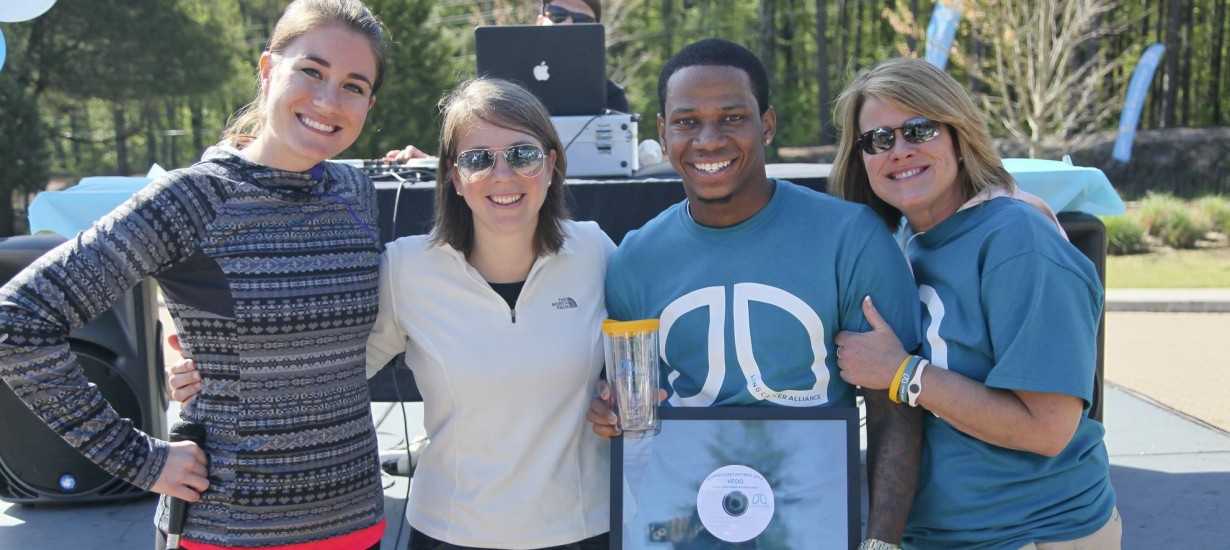Shining a Light on Lung Cancer

When Kristen McAvoy ’12 picks up the phone at work, she knows it’s inspiration calling.
As events and volunteers manager for the Washington, D.C.-based Lung Cancer Alliance, McAvoy spends much of her time supplying health care providers, lung cancer patients, their families and friends – all of whom are volunteers – with the tools to help support research and care in their own communities.
“It reminds you that people do care,” said McAvoy. “They inspire me.”
Fundraising and awareness events are spread around the country throughout the year, with the biggest concentration coming during Shine a Light on Lung Cancer gatherings in Lung Cancer Awareness Month in November. In 2014, the organization supported a then-record 172 Shine a Light events; this year, that number grew to nearly 200.
Activities such as Shine a Light raise awareness and educate the public about lung cancer through community presentations by doctors and stories and tributes from patients and people who have lost loved ones to lung cancer. Shine a Light events culminate with the shining of flashlights during a moment of silence.
“It is a great way to end the event, incorporate the lights and pay tribute to all lung cancer survivors as well as those who have lost their battle with lung cancer,” McAvoy said.
As part of the team at the Lung Cancer Alliance — a nonprofit organization that offers support for patients and their loved ones, advocates for increased funding for research and conducts nationwide education campaigns — McAvoy helps Shine a Light event organizers plan logistics, assists with publicity and often lends an understanding ear to those affected by the disease.
“They want to know about Shine a Light, but they also want to know that someone is listening,” McAvoy said.
As the No. 1 cancer killer and the No. 2 killer behind heart disease, lung cancer has effects that are far-reaching and sometimes heartbreaking, yet research on the disease receives less federal funding than breast, prostate or colon cancers, McAvoy said.
“Until groups like the Lung Cancer Alliance started advocating for increases in research funding at the federal level, most efforts to combat lung cancer focused solely on tobacco cessation,” McAvoy said. “Stigma around this disease that most people link to smokers is definitely a part of the underfunding as well, even though close to 80 percent of those diagnosed are actually [nonsmokers] or former smokers.”
McAvoy said the survival rate for lung cancer historically has been lower than some other cancers, which meant fewer voices asking for increased funding.
Finding her voice
Being one of those voices is a position McAvoy, who double-majored in journalism and mass communication and political science at UNC, always wanted to be in.
She arrived in Washington as one of seven Star Fellows through Running Start, a program to encourage and support young women in politics, and interned with U.S. Rep. Renee Ellmers of North Carolina.
That experience was valuable, McAvoy said, but she learned that as one staff member contributing to the decisions of just one member of Congress, her impact wasn’t going to be as great as it might be elsewhere.
“I wanted a job where I could quantify what I do and see change,” she said. “I didn’t feel like I was contributing in the way I wanted.”
She turned her focus to nonprofits and her interest in women’s health issues, including an internship in Uganda through Advocates for Grassroots Development in Uganda, a UNC student initiative. McAvoy spent a summer in a small village on Lake Victoria, teaching English and working on a project to supply clean water.
“That was a very eye-opening experience,” she said. “It really touched me and showed me women are really responsible for their family’s health. That’s always stuck with me.”
She saw parallels between that small village and life in the United States, noting that in her opinion, women are usually the ones who stay on top of their families’ health care.
McAvoy found what she was looking for at the Lung Cancer Alliance. When she’s not assisting with Shine a Light, she’s working on logistics for events such as the Lung Love Run/Walks, 5K fundraising and awareness events held across the U.S. throughout the year.
Sometimes the timing of those events brings a poignant reminder of what’s at stake. When planning events six months to a year out, she works with patients who might not be around to see the end result.
In particular, she remembers a woman she befriended after they met at a conference and who lost her battle with cancer.
“She was 34 – I think I related to her,” McAvoy said. “It was so easy to talk to her. … She was so young, and a nonsmoker.”
But in that loss, McAvoy recognizes that the work she does helps return inspiration to the people often on the other end of her phone calls.
“It’s so great for me to be able to give them the tools,” she said. “People get so excited to see an event in their area they can attend and help out with.”
— Lea Hart
